Is it safe to travel to Pakistan? After years of firsthand experience—and running tours in Pakistan—here’s my answer, including advice on where it is and isn’t safe to travel, safety tips for travel in Pakistan, and more.
You’ve seen photos of epic mountains and jaw-dropping shrines. Heard tales of boundless hospitality. Read articles saying Pakistan is the next best travel destination. You want to travel to Pakistan, but you’re still wondering: is Pakistan safe?
Your family and friends might be dubious, telling you Pakistan isn’t safe, but listen to me, not them. I’ve independently traveled all across Pakistan for years. Clearly, I’m not dead; that, at the very least, proves you’re not guaranteed to be blasted to bits upon arrival.
… but I assume you’re interested in a more nuanced answer than “No blasting anticipated”.
I have traveled through Pakistan for years in total, visiting the country for the first time in 2016. I organize both Pakistan women’s tours and Pakistan motorcycle tours. I run a travelers’ hostel in Islamabad. I have ridden a motorcycle solo across the entirety of the country. I have been to all provinces, traveled both solo and with friends, moderate two Facebook groups related to travel in Pakistan, and have more experience with traveling in Pakistan than most other travel bloggers who’ve been there… combined. Read on for my firsthand thoughts on whether Pakistan is safe to travel.
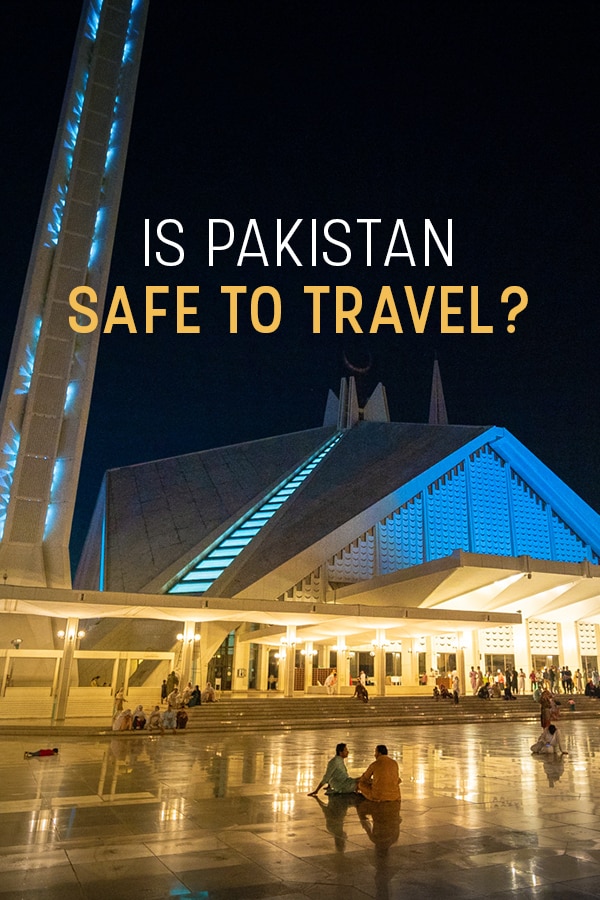
Helpful? Pin it!
Is Pakistan safe to travel?: Table of Contents
- Is Pakistan safe to travel?
- Pakistan’s security situation
- Why you’ll be safe in Pakistan
- What areas are unsafe for travel?
- How about the other regions?
- High-risk places and events
- Safest places to travel in Pakistan
- Is it safe to visit Peshawar?
- Actual dangers of traveling in Pakistan
- Is it safe to drink the water in Pakistan?
- Is it safe to go trekking in Pakistan?
- Best travel insurance for Pakistan
- Safety tips for travel in Pakistan
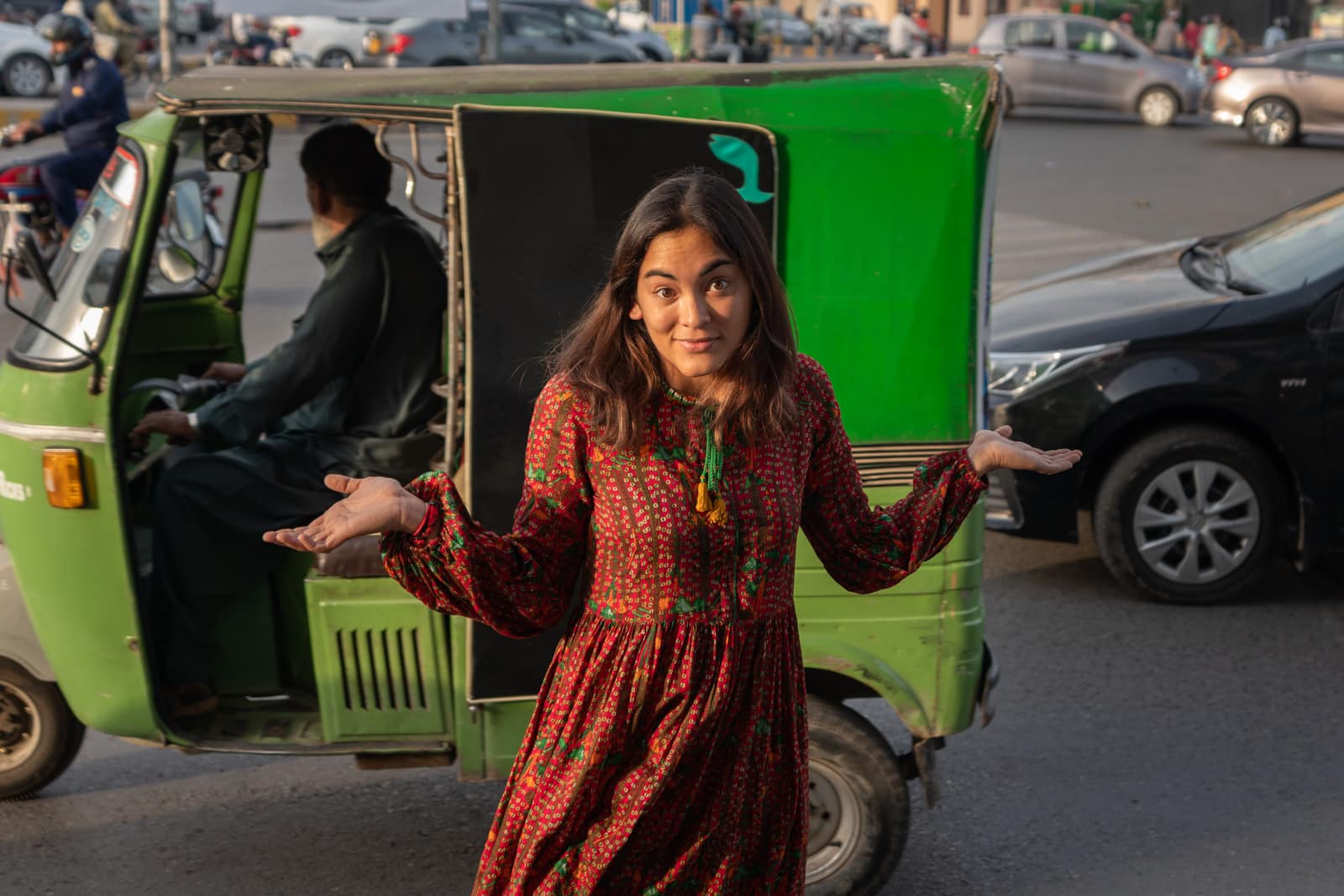
Do I think it’s safe to travel Pakistan? Listen up.
Is Pakistan safe to travel?
If you want to travel to Pakistan, Pakistan is currently safe for travelers of all genders. There are still security issues in more remote areas of the country, but after years of struggle with violence and terrorism, many places in Pakistan are now safe for locals and foreigners alike. As with any travel, you should do your research before deciding to travel to the country.
Though I don’t think it’s the easiest country to travel for a variety of reasons, I firmly believe adventure travelers and other experienced travelers should consider visiting!
In short: yes, Pakistan is safe to travel.
Is Pakistan safe?: What’s actually going on with Pakistan’s security situation?
The country stabilized immensely since peak Taliban activity around 2009-2012. Pakistan’s military has a tight hold on the country to maintain peace. ISI, the country’s intelligence agency, is highly active behind the scenes ensuring potential threats are dealt with before harm comes to anyone. Streets might seem militant because of all the checkpoints and army personnel, but they are far safer than they were before.
The Pakistan you see on the news—guns, bombs, and terrorists galore—is far from the reality of Pakistan on the ground. Places that casual tourists are likely to visit are peaceful these days. There’s little need to fear acts of terrorism. Come and see for yourself that Pakistan is safe!
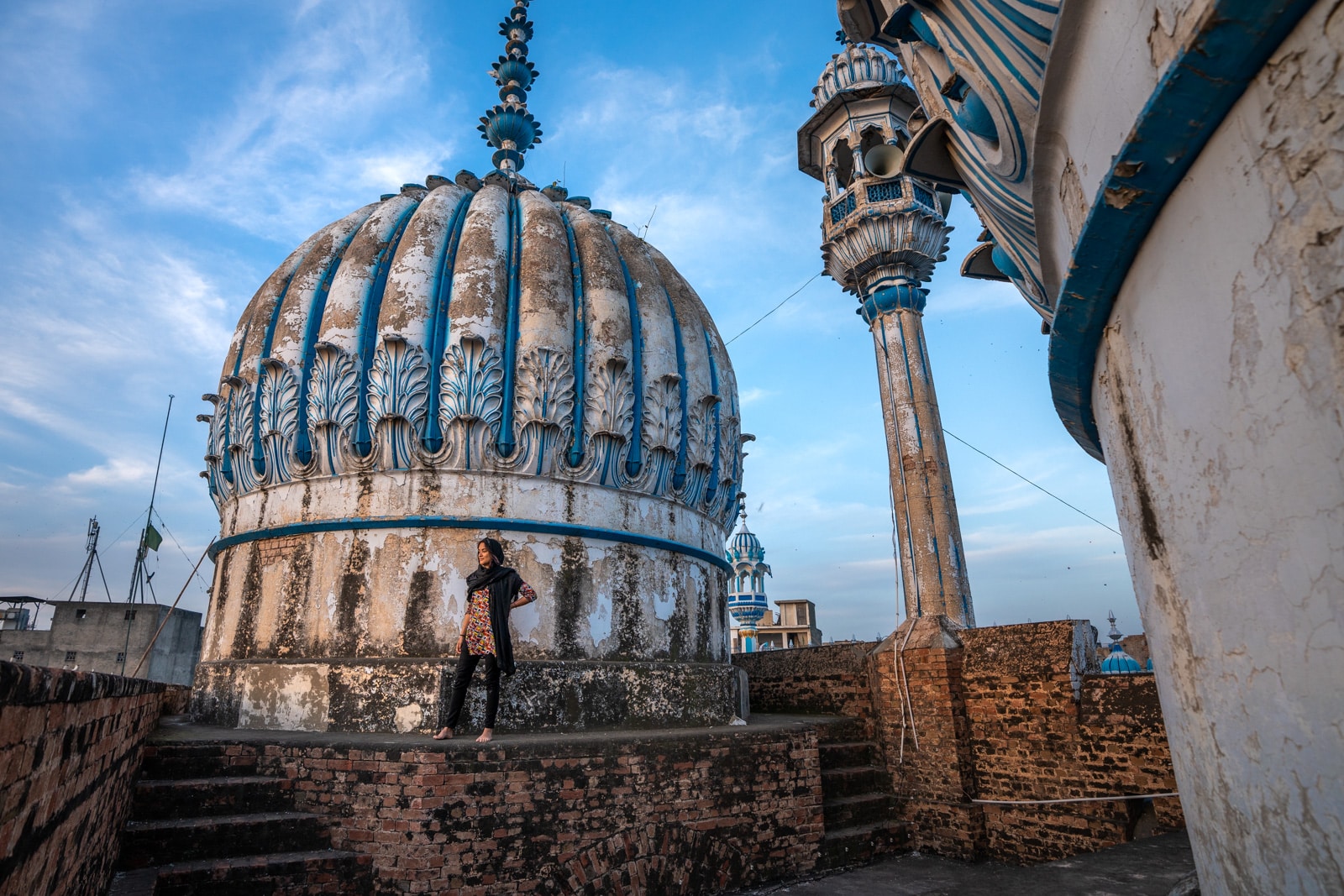
Rooftop views from Rawalpindi’s Jamia Masjid
Why you’ll probs be safe traveling in Pakistan
Not convinced yet? Showing this to your mum and she’s still not convinced? Fair enough.
It’s important to note how unlikely it is that the average tourist will be harmed in Pakistan.
Normal tourists are unlikely to come to harm because…
It’s extremely difficult to enter dangerous areas. Pakistan’s security organizations require something called a Non-Objection Certificate (NOC) for most high-risk areas. Aside from the NOC tourists receive if crossing the Iran-Pakistan border, it’s virtually impossible to get an NOC for other areas without a powerful local’s help/sponsorship. If you don’t have an NOC, you’ll be turned back at a checkpoint. In short: if you visit Pakistan, you’re unlikely to actually enter any dangerous areas.
Attacks or threats usually occur in places the average tourist wouldn’t be. Think police headquarters, cities in areas requiring NOCs, minority religious events that most tourists don’t know about, let alone be comfortable visiting (crowds of men 4 dayzzzz).
Security escorts are common in risky areas tourists can visit. In some places, foreign tourists are assigned armed security guards to escort them around. My thoughts on this matter are another story entirely, but I won’t deny it adds extra security to your existence. Fairy Meadows is the most common destination where this is the case.
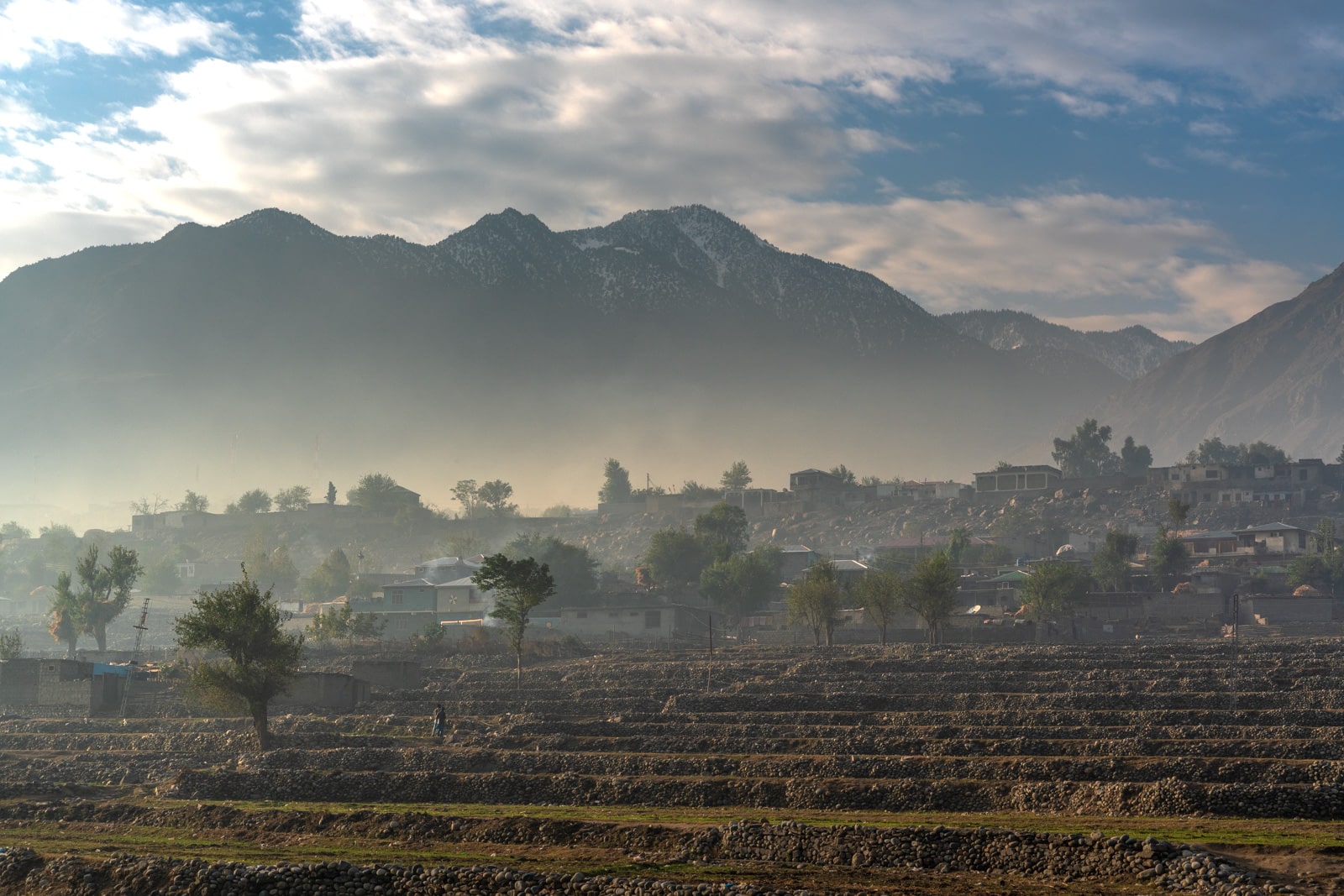
The area around Chilas has seen its share of violence in recent years, but travelers are allowed to pass through without restriction these days.
What areas are “unsafe” for travel in Pakistan?
There are several regions in Pakistan that, though not entirely dangerous or filled with evil folk, are riskier than others.
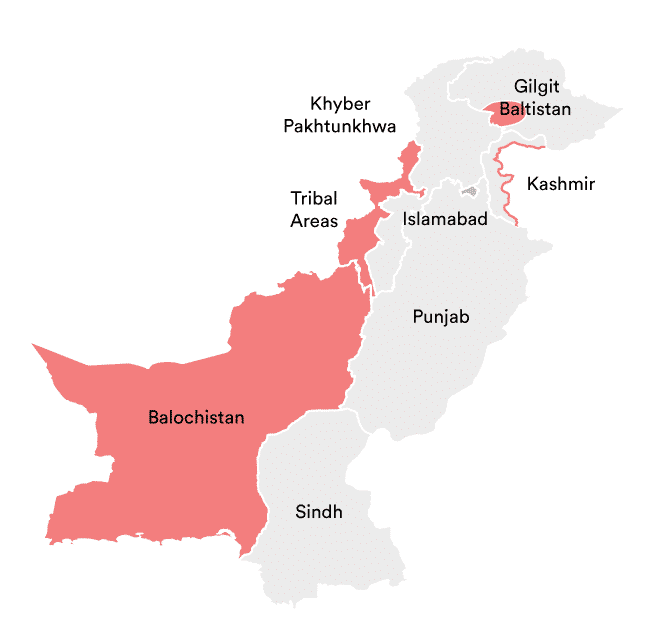
A rough idea of the “unsafe” and no-go areas for travelers in Pakistan
Balochistan province
Why: Balochistan is risky for a variety of reasons. Bandits prey upon people in the center of the province. The road for the economic corridor China is building through the country (CPEC) is sensitive for those who don’t want it to be constructed. Balochistan harbors separatists who want to create their own Baloch state.
Allowed to visit? Pakistani tourists can travel freely in Balochistan. Foreigners are not allowed to visit any of Balochistan without an NOC, and will not receive one unless crossing into/out of Iran. However, some foreigners have snuck in to drive the Makran Coastal Highway and visit Hingol National Park with the help of locals.
Federally Administered Tribal Areas (FATA)
Why: Some of the “agencies” along Pakistan’s western border with Afghanistan still see violence and harbor terrorist groups, along with other people doing unscrupulous things along the border.
Allowed to visit? Though recently absorbed into Khyber Pakhtunkhwa province, all foreign tourists need an NOC to visit any of the tribal agencies. Local tourists can visit, though they need to provide their CNIC to enter FATA.
Line of Control in Kashmir (LOC)
Why: The border in Azad Kashmir between Pakistan and India has been disputed for years, and still sees occasional crossfire. It’s extra off-limits now given rising tensions between Pakistan and India. Foreigners who go too close are almost certain to be considered spies.
Allowed to visit? Foreign tourists can now visit parts of Kashmir that are more than 10 kilometers away from the India-Pakistan border, such as Muzaffarabad and Mirpur. Note that this rules out popular destinations for local tourists such as Neelum Valley, and you might still encounter difficulties when entering Kashmir.
Kohistan and Diamer (Dasu to Chilas)
Why: In the area of the Karakoram Highway between Dasu and Chilas there is serious poverty and a lack of education and gender equality, even by Pakistan standards. There were many attacks in this region in the past, and though the area is now relatively safe and the Karakoram Highway is frequented by tourists, it still sees some issues such as the burning of girls’ schools in 2018.
Allowed to visit: Tourists can drive along the Karakoram Highway. Foreign tourists can now move freely in Chilas. Public transport usually has an armed guard riding along within this region. Solo travelers may receive a security escort in the area around Dasu town. Note that you need an NOC for any of the side valleys off the KKH in this area, such as Darel.
How about the other regions in Pakistan?
But are the other regions in Pakistan safe, I hear you ask? Here I’ll go over them quickly.
Sindh
The southern province of Sindh isn’t on many tourist radars (although I think it should be). Some people visit Karachi and maybe Sehwan Sharif, but that’s about it. Because of this, many foreigners still think Sindh is a scary, dangerous place. The fact that some Pakistani’s will tell you the same doesn’t help.
Although Karachi has a reputation for being dangerous, tourists are hardly ever the target of crime here. Other parts of Sindh are equally friendly to tourists, and although Sindh is underdeveloped, it’s relatively safe to travel here. The only area that’s really off-limits is the That Desert.
The biggest problem in Sindh is often finding (budget) accommodation, as many places can’t host foreigners, and overzealous security personnel who’d rather see you leave than do extra work. In some cases, local authorities insist you need a security escort, but there are no hard and fast rules about this in Sindh.
Read: Digging deeper into South Pakistan with my Sindh travel guide
Punjab
As I mention a bit further down, Lahore is a safe city for foreign travelers and almost all people who visit Pakistan visit Lahore. Other parts of Punjab are safe for travel too. However, rural Punjab doesn’t see many foreign tourists yet, so you might be bothered by an overprotective security guard, and it’s possible some hotels won’t allow you to stay.
There are several cities in Punjab where foreigners can’t move around freely. Bahawalpur and Multan are prime examples. If the police find you wandering around these cities, it’s likely they’ll put you on the next bus back to where you can from. This is not because these cities are dangerous (although the police will tell you this to get rid of you), but because of army and intelligence activity in these cities. They don’t want snooping foreigners. If you want to visit these cities, find a host through Couchsurfing who knows about the situation.
Khyber Pakhtunkhwa (KPK)
Many people think KPK is still a hotbed of terrorism, and that foreigners aren’t really allowed to travel here. Although this was true in the past, now foreigners can travel freely through most of KPK province.
I have a special section on Peshawar further down this article, but KPK offers much more than this amazing city. Although I think most places in KPK, such as Swat, Chitral, and the Kalash Valley are safe to travel to, visitors should know KPK is still very conservative. Foreigners should take care to not offend local customs when traveling here.
There are a few places in KPK that aren’t safe for foreigners, as I mentioned above. But fear not, you won’t be allowed to stay here anyway.
Gilgit Baltistan (GB)
Gilgit Baltistan is among the safest places in Pakistan. You can find more info on GB further down this guide.
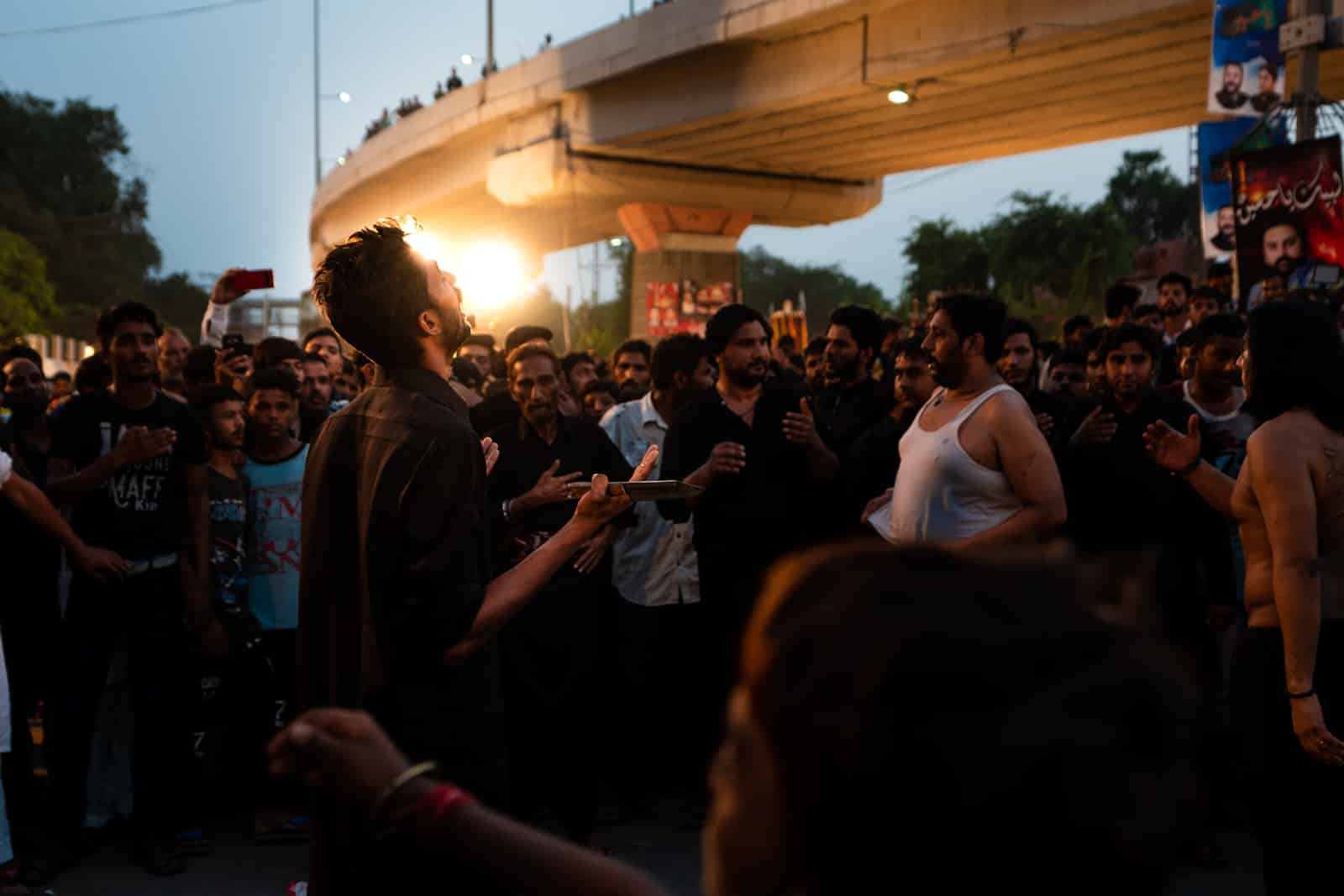
A Shia man praying at a gathering for Ashura, a day of significance during Muharram, a month of mourning. Shia events such as these are sometimes targeted by those who disagree with their practices.
High-risk environments in Pakistan
Though most gatherings are fine, there is a larger risk of terrorist attacks at certain kinds of places and gatherings in Pakistan.
Minority religious groups and activities are a common target for terrorists in Pakistan. Minorities are basically any non-Sunni religious groups. Think Shia Muslims and their holidays such as Ashura/Muharram, or Sufis and festivals like the urs in Sehwan Sharif or the urs at Data Darbar in Lahore. Sufi shrines were targeted several times in recent years:
- May 2019: Bombing of Data Darbar in Lahore
- Oct 2017: Bombing of shrine in Quetta, Balochistan (not accessible for foreigners)
- Feb 2017: Bombing of Lal Shahbaz Qalandar’s shrine in Sehwan Sharif, Sindh
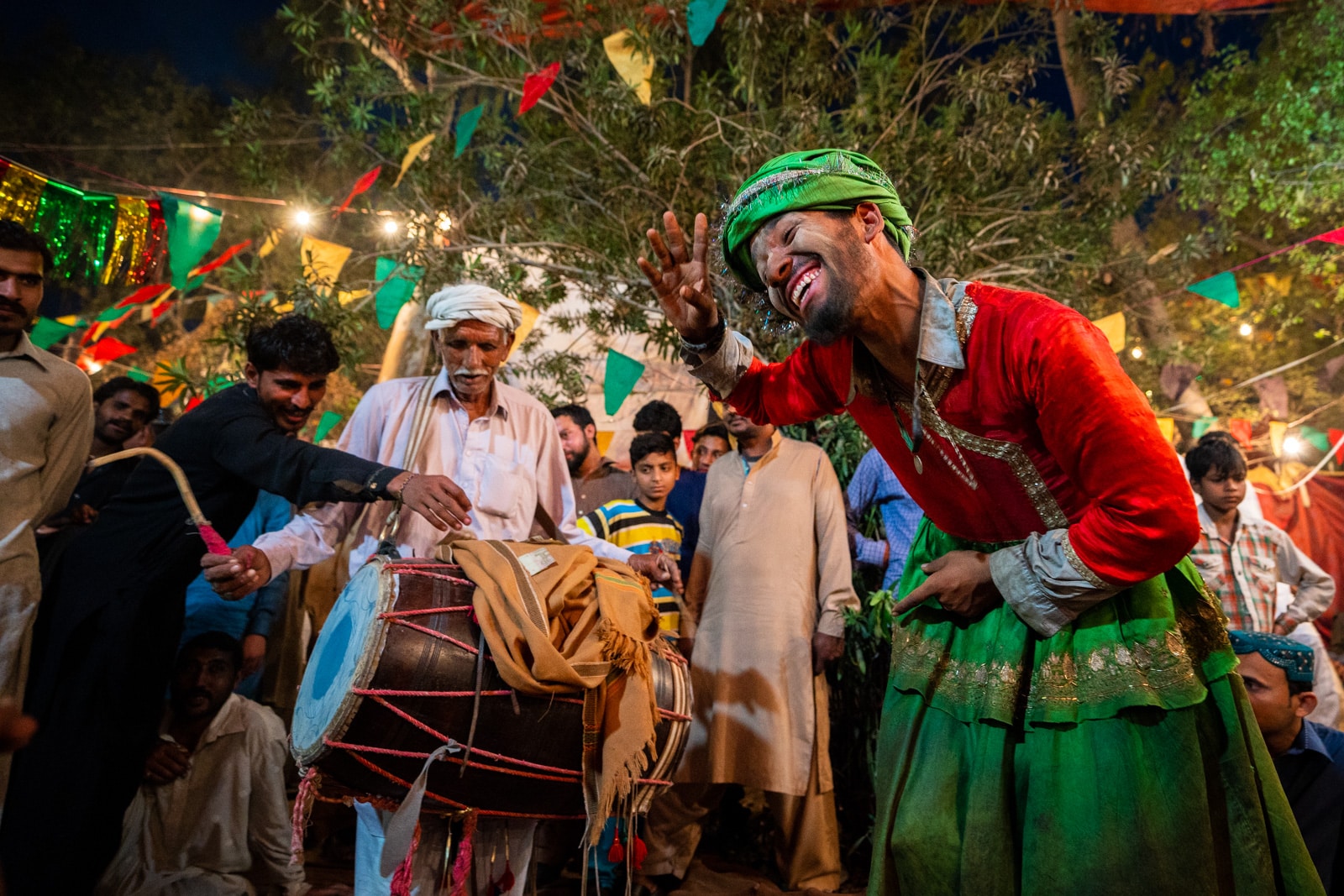
A man dancing at the Sufi Mela Chiraghan festival in Lahore. Does he look dangerous to you?
Does that mean you should stay away from minority groups or events in Pakistan?
If you’re traveling off the beaten track in Pakistan, you should be able to inform yourself of risks and make calculated judgments as to whether or not you find risks worthy.
Personally, I find it worth the risk to learn more about groups and events firsthand. I regularly attend Sufi gatherings in Lahore, have visited Hindu temples and Sikh gurdwaras around the country, and spent days in the thick of crowds during Muharram and Safar, months of mourning particularly significant for Shia Muslims. All of which go against my government’s recommendations.
It’s worth noting that security at large minority events is intense. Spotlights, truck barricades, barbed wire, police everywhere, blocked mobile signals. And then some. Yes they are risk areas, but security officials account for that and do everything they can to mitigate. At times they might not want to allow foreigners in because of the security risks—it’s useful to have locals with you to help.
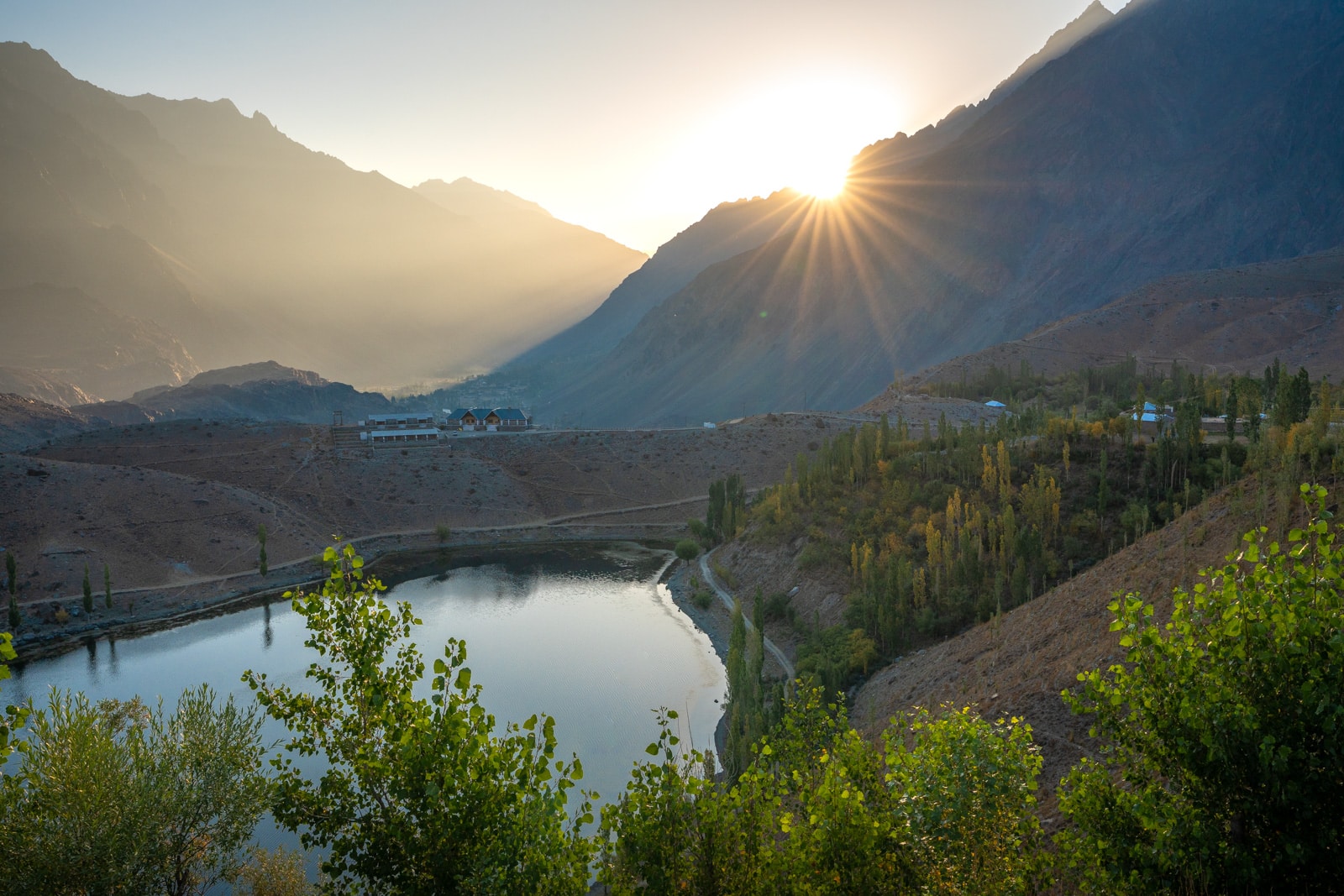
Sunrise over Phander Lake, a peaceful place in Gilgit Baltistan
Where are the safest places to visit in Pakistan?
No place is 100% safe, of course, but some places are calmer than others in Pakistan!
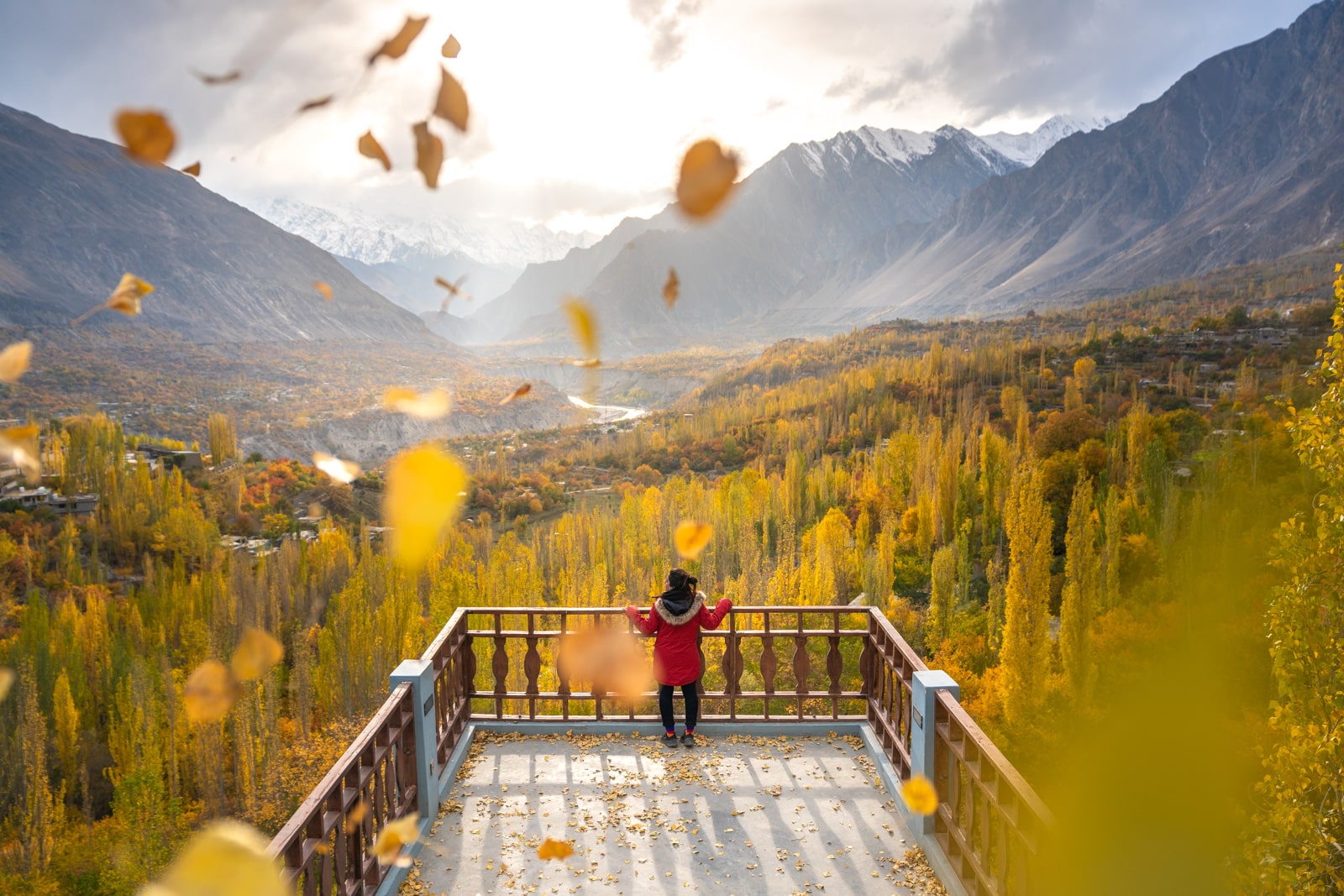
My friend Hina in Karimabad, Hunza
Hunza, Gilgit Baltistan
Most people who visit Pakistan, want to travel to Hunza at one point or another. Gilgit Baltistan as a whole is quite peaceful, but if you’re looking for ease of travel, welcoming people, and a very safe track record, Hunza is the place to start.
The most touristed region in northern Pakistan has been peaceful for decades, and aside from a small number of harassment incidents, most travelers have an easy and safe experience in Hunza. Many travelers—foreign and domestic—visit each year for trekking, motorbiking, and more. I also recommend Hunza to all first time (solo) female travelers in Pakistan.
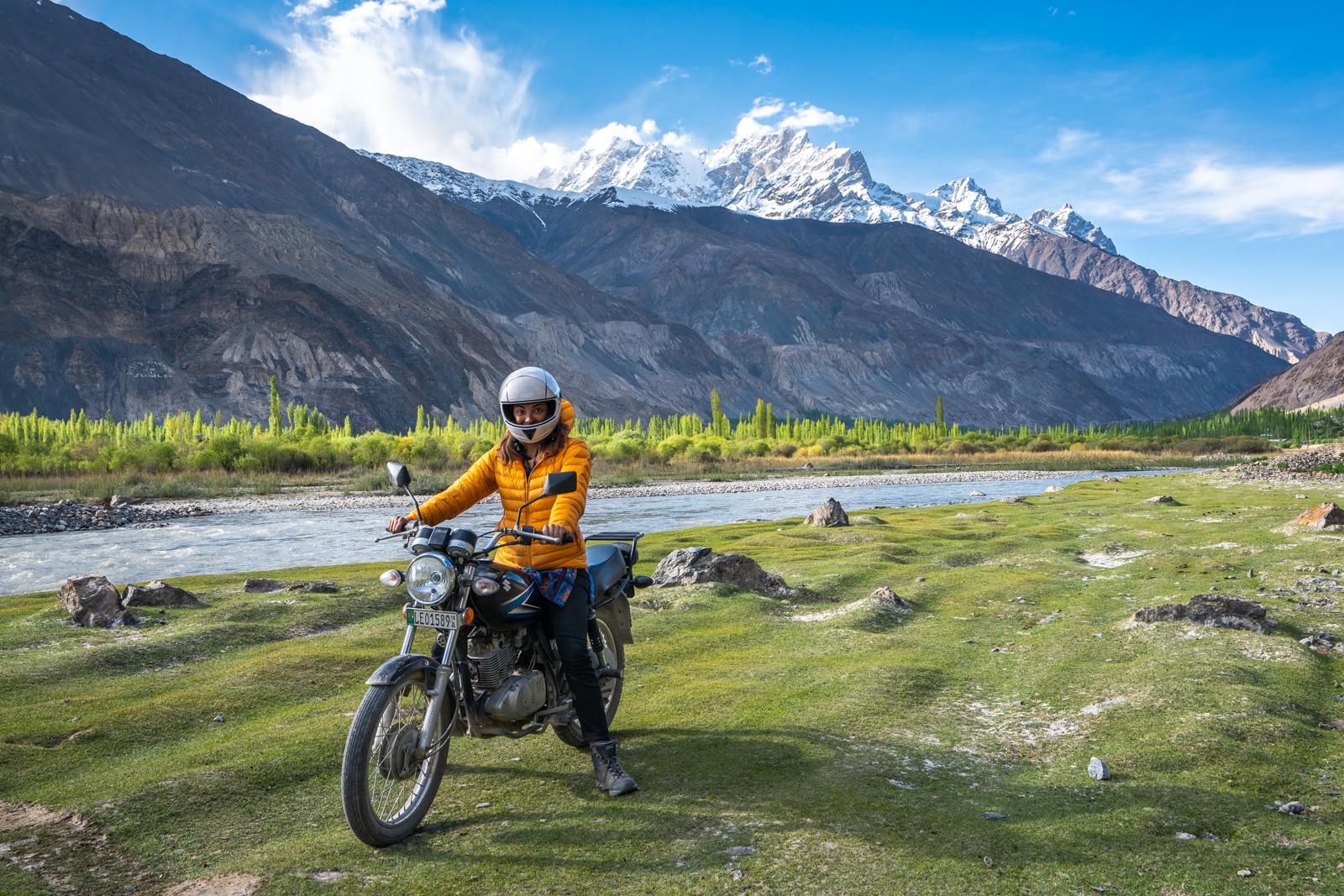
Motorbiking in Yasin Valley, Ghizer
Ghizer, Gilgit Baltistan
Like Hunza, Ghizer district to the west of Gilgit city (along the road to Shandur Pass) is peaceful. Home to generally well-educated and open-minded Ismaili Muslims, it’s a very welcoming place for travelers. Ghizer is my favorite district in Gilgit Baltistan—Phander Valley is a good place to start.
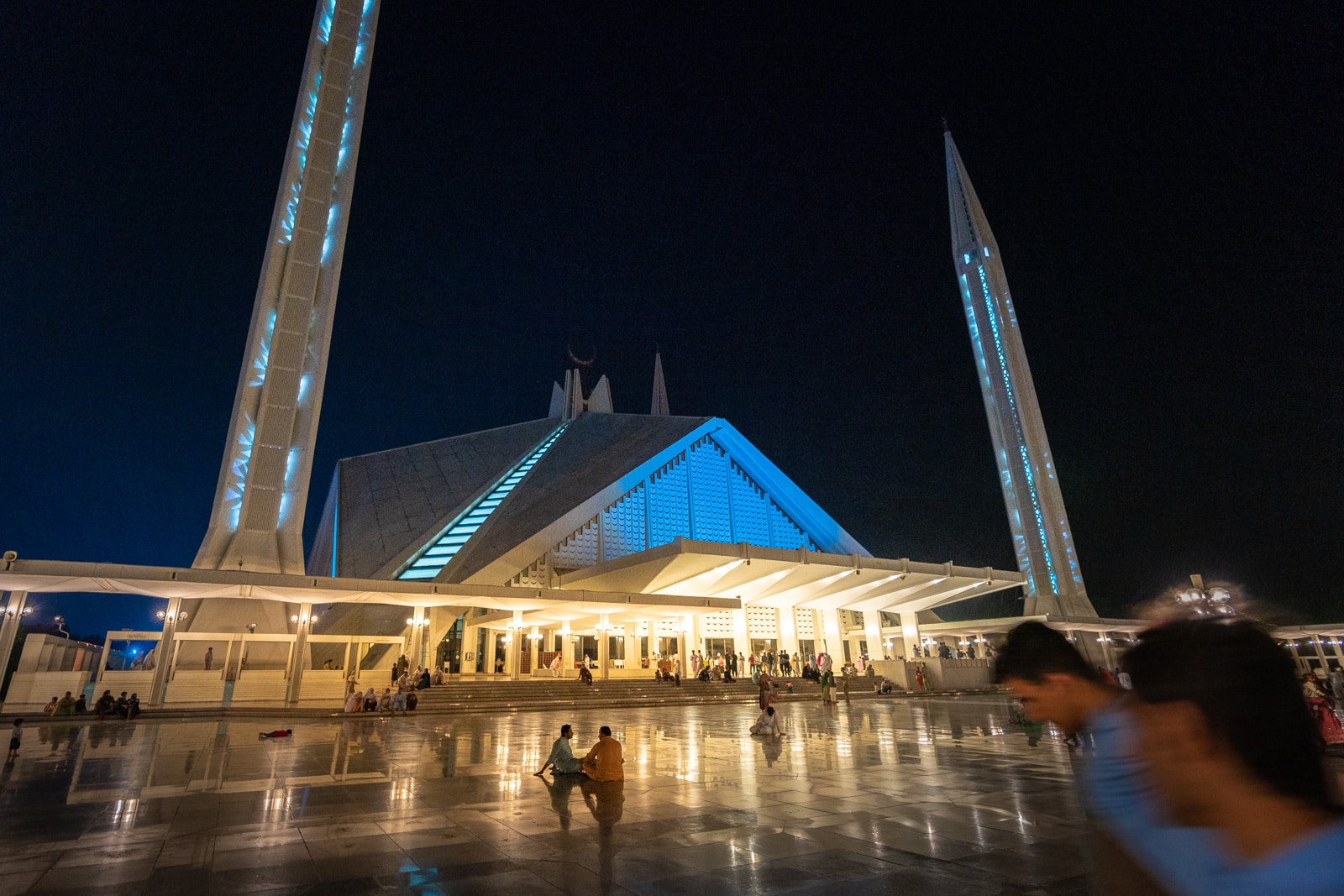
Faisal mosque at night
Islamabad
Pakistan’s capital is, hands down, the safest city in Pakistan. Admittedly this leads to a very sterile experience (in my opinion, anyway) but it’s a safe and very forgiving starting point for any Pakistan trip. Check out some of my favorite things to do in Islamabad to get your trip started on the right foot.
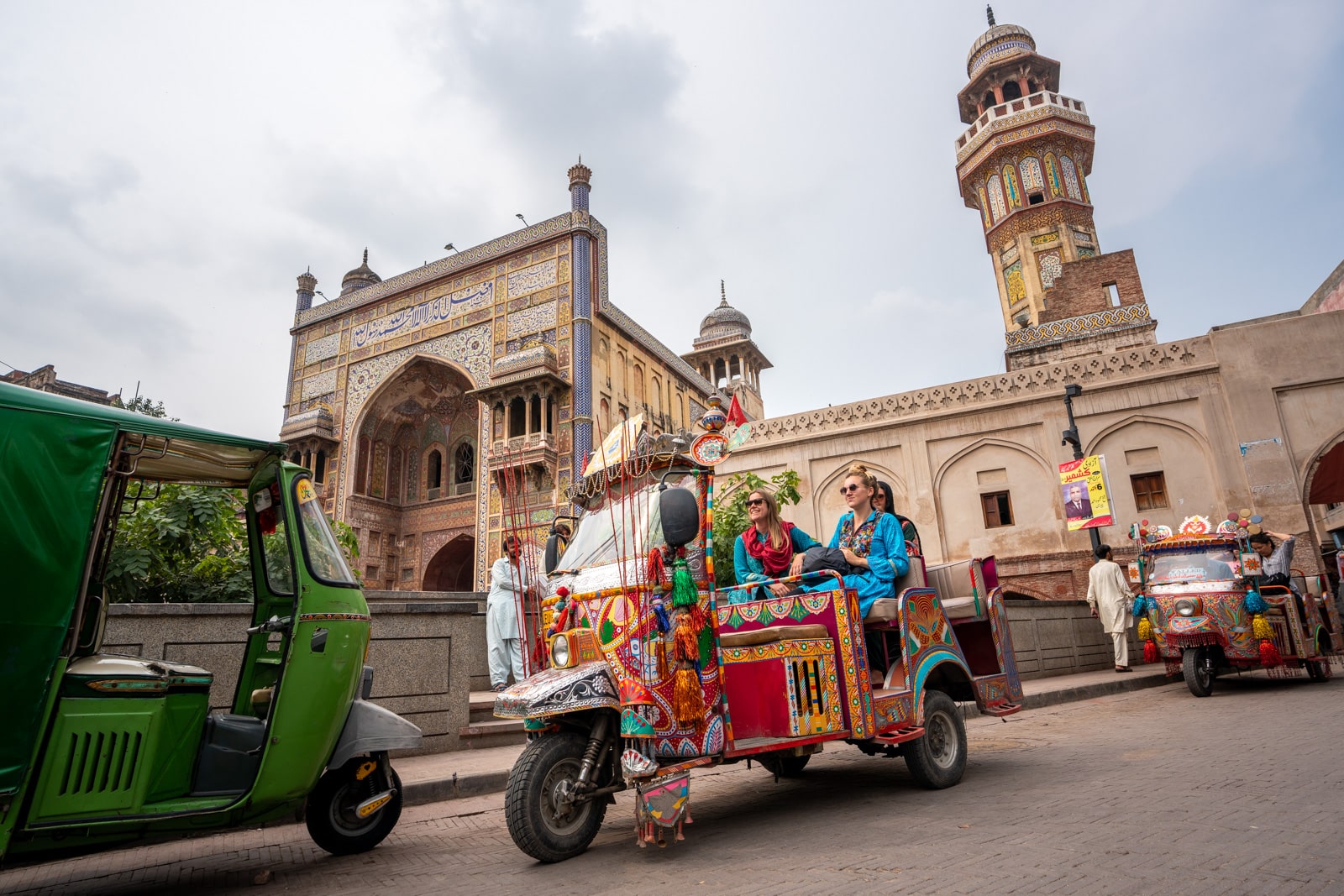
Women from my women’s tour sightseeing in Lahore
Lahore
My favorite city in Pakistan is also relatively safe for travelers. People are quite used to seeing foreign tourists in Lahore, especially in the historical areas, and the city is quite well managed security-wise. The normal risks associated with visiting big cities exist—think harassment, petty theft, etc.—but as a whole, Lahore is welcoming and a good addition to any trip.
Note: To be fair, all of Pakistan’s major cities—Islamabad, Lahore, Karachi, Peshawar—are safe enough to visit. Standard precautions should still be taken, especially in Karachi where snatching of phones and bags still sometimes occurs.
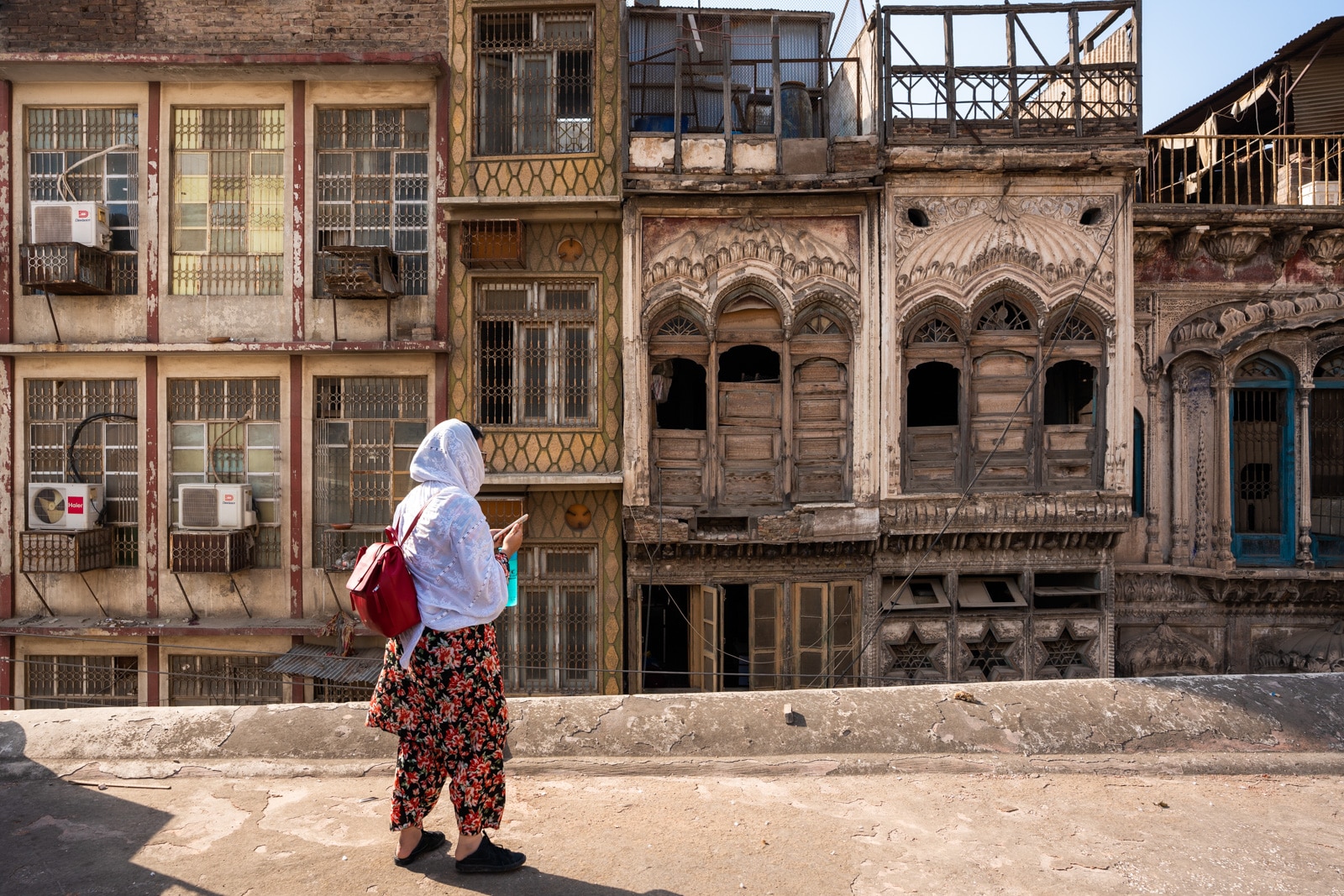
My friend Azeema showing me around Peshawar
Is it safe to visit Peshawar?
Close to Afghanistan’s border with a reputation for being a terroristic Wild West where guns and hashish are sold openly and women flutter through the streets in burqas, it’s understandable why people are apprehensive about visiting Peshawar. Foreign tourists used to receive security escorts when visiting Peshawar, and many governments still advise not to visit.
But these days it’s safe to visit Peshawar, and I highly recommend it! The City of Flowers is working hard to rebuild and attract tourists after being ravaged by violence in recent decades. Though its visible conservatism might initially shock, it’s home to some of the most beautiful buildings I’ve seen in Pakistan—don’t miss the Sethi Haveli and Mahabat Khan mosque—and Pashtuns are indisputably the most hospitable people in Pakistan.
Note: You might have trouble finding accommodation in Peshawar; most hotels don’t allow foreigners. If on a budget, Al-Ibadat Hotel in Peshawar has rooms for around 800 PKR/night. Couchsurfing is another option—it’ll provide an opportunity to learn about Pashtun culture from the source. Female travelers, be on guard; many solo female travelers have had bad experiences Couchsurfing with less reputable hosts in Peshawar.
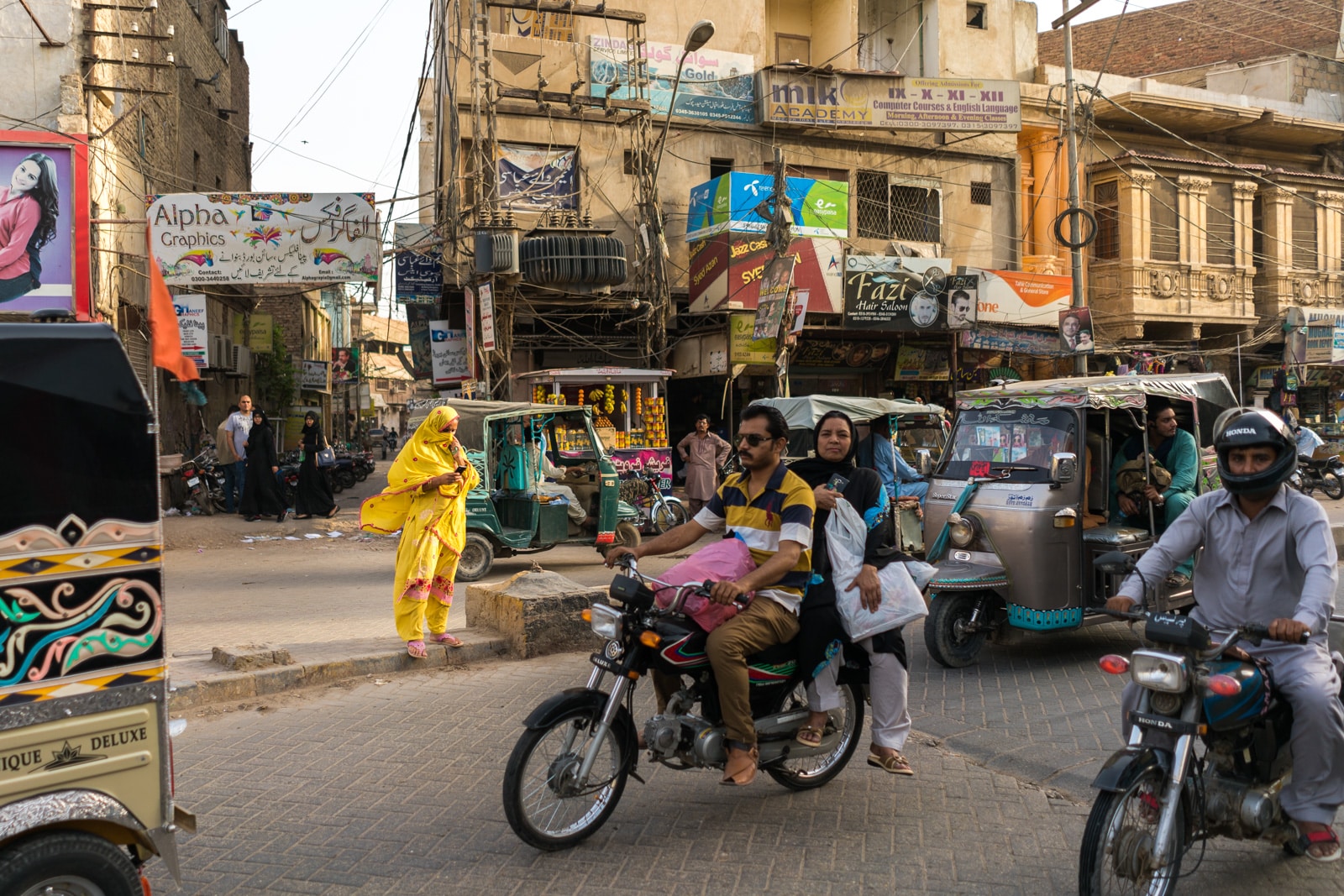
Traffic is a far more legitimate danger to travelers in Pakistan than terrorism…
What are the actual dangers of traveling in Pakistan?
Oh, you mean besides the 5 most serious dangers of traveling in Pakistan?
Jokes aside, here’s what I think travelers should actually be careful of while in Pakistan:
- Harassment. Groping, stalking, and sometimes more is a common experience for both male and female travelers in Pakistan. Groping is particularly common in large crowds.
- Road accidents. Pakistani drivers be cray. Roads in cities are busy. Many truck and bus drivers give no fucks and consume large amounts of hashish while driving their routes. Watch out, and never step in front of a moving bus.
- Food poisoning. Hygiene standards in Pakistan are poor. Combined with the excessive use of oils and spices in the food, it’s common for visitors to have tummy issues at some point during their trip.
- Violence or stampedes in large crowds. People can be hotheaded in Pakistan, and when people get worked up… they get really worked up. Be careful in large crowds that are getting unruly—it’s easy for violence to flare up or stampedes to start.
- Altitude. Many villages in northern Pakistan are at high enough altitudes to cause altitude sickness, and many common passes (Babusar Pass, Khunjerab Pass) are 4,000m+. Not to mention that many people come for high-altitude trekking, such as the K2 Base Camp trek. Take it easy when climbing higher, and if you feel ill please don’t hesitate to take a break or move to lower altitudes.
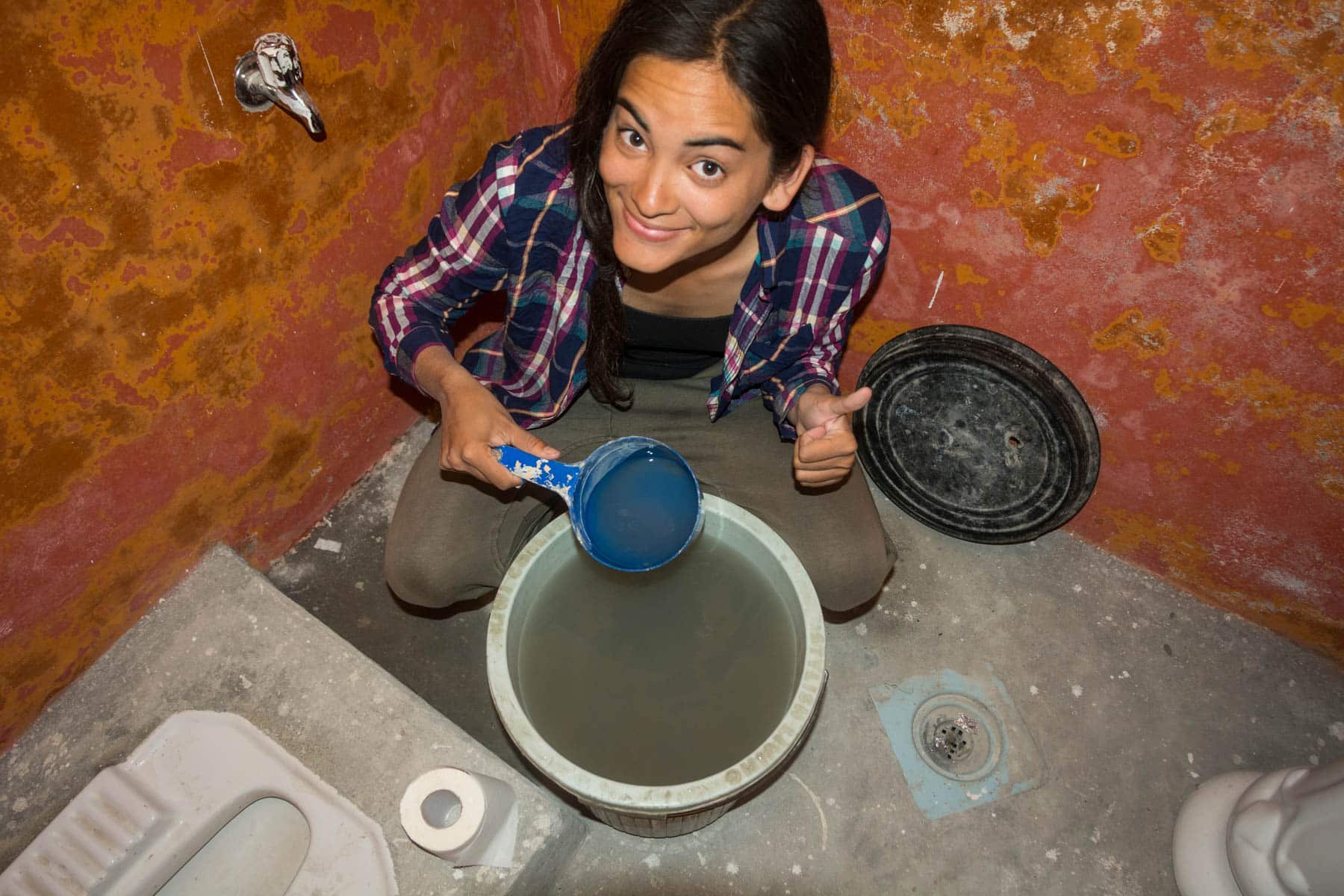
Glacier water in Sost, which people insisted was healthy and safe to drink. Um, I don’t think so.
Is it safe to drink the water in Pakistan?
Tap water is not safe to drink in most parts of Pakistan, especially in the major cities. Most urban Pakistanis drink filtered or bottled water. I personally use a Steripen to clean tap water, and LifeStraw bottles are another great no-waste alternative to bottled water.
In mountains, tap water is sometimes acceptable to drink. People will offer you cloudy glacier water, insisting it’s healthy and full of minerals. I do not recommend drinking glacier water without filtering; this glacier water has been linked to kidney problems in local populations.
However, some people get or pipe their water directly from mountain springs. Springwater is clean and safe to drink. The risky part is you don’t know how good their piping system is… or the last time it was cleaned. Whether or not you take the risk is up to you, but I usually accept spring water. Again, a Steripen is handy if you don’t want to take a chance.
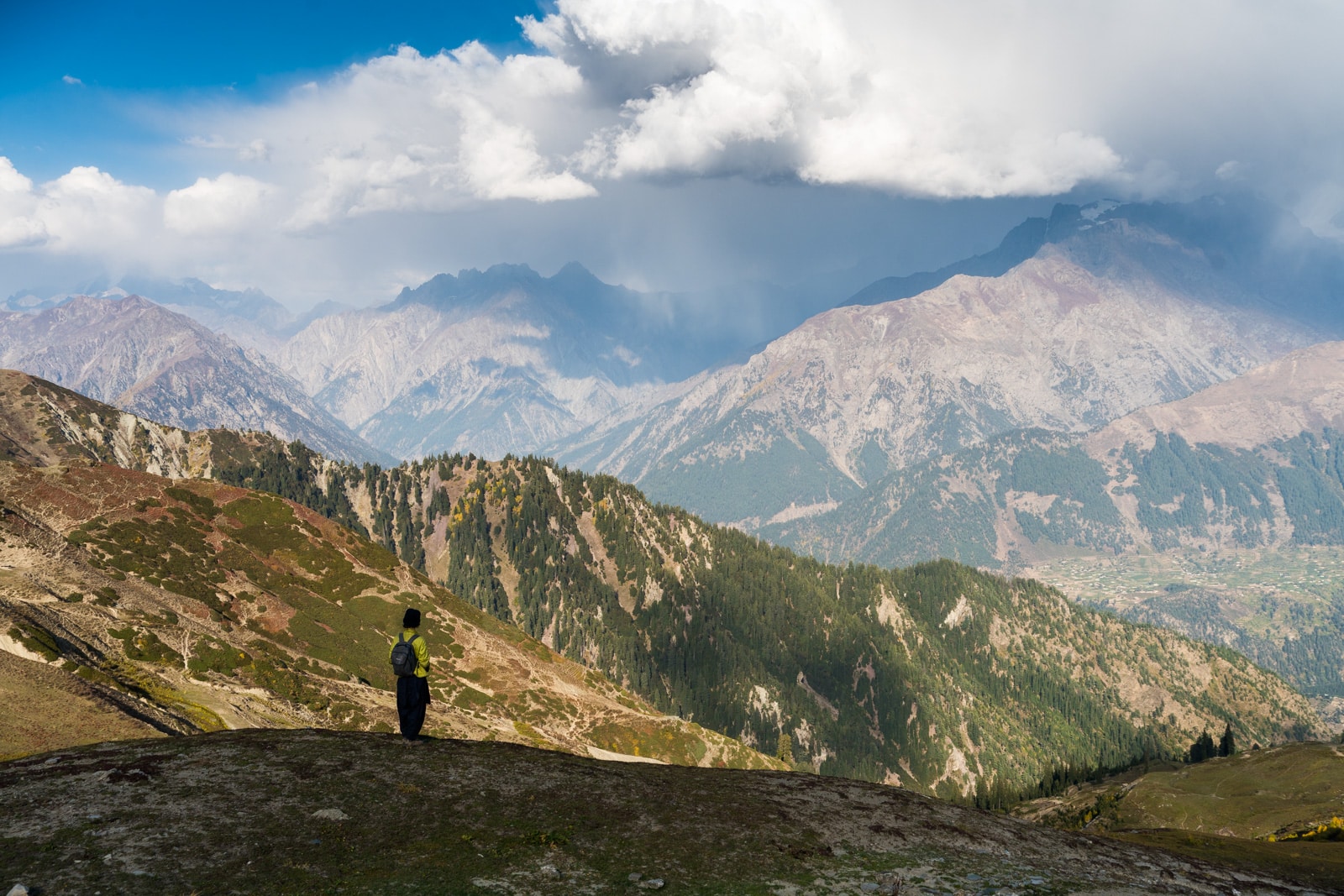
Trekking in Swat Valley, Pakistan
Is it safe to go trekking in Pakistan?
Yes, it’s generally safe to trek in Pakistan! Pakistan is heaven for mountain lovers. Hardcore mountaineers and casual trekkers alike flock to its mountain ranges every year.
However, trekking in Pakistan isn’t like trekking in more developed countries. Trails are not well marked, maps are not readily available, and you won’t find the teahouse to teahouse kind of trekking you see in countries like Nepal. Proper healthcare is often a long journey away, which means you need to be well-prepared in the event of an accident.
It’s highly recommended to hire local guides if doing any overnight/long treks in Pakistan. They know the mountains better than anyone else, and will prevent you from getting lost or ending up somewhere dangerous.
If you don’t want to hire a local guide, I recommend basing yourself in a village and doing day treks from there. Some ideal bases for day treks are Kalam in Swat Valley, Gulmit or Karimabad in Hunza, and Skardu in the east.
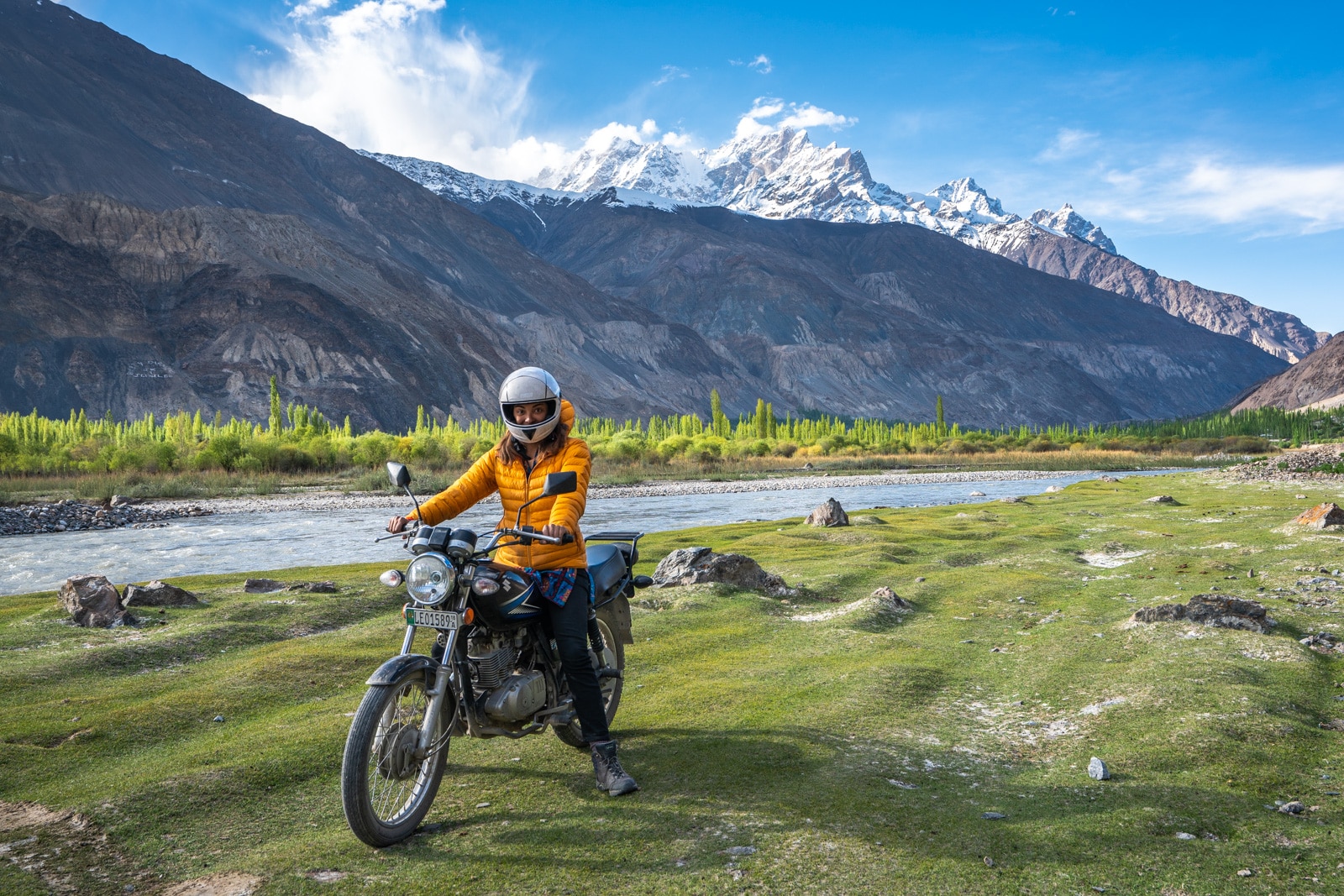
Motorbiking in Pakistan is grand… but risky. That’s where insurance comes in!
Best travel insurance for Pakistan
In Pakistan, anything can happen. Anything. From unexpected hospital visits due to food poisoning to needing to be airlifted out after a trekking or motorbiking accident, there are a lot of potential risks to traveling Pakistan. I highly recommend travelers going to Pakistan invest in travel insurance.
I use and recommend World Nomads travel insurance for traveling in Pakistan. They’re easy to use and communicate with, their standard plans cover most areas of the country tourists will visit, and you’re covered at high enough altitudes for all of the standard treks and areas the average tourist goes to. Get a quote from World Nomads here.
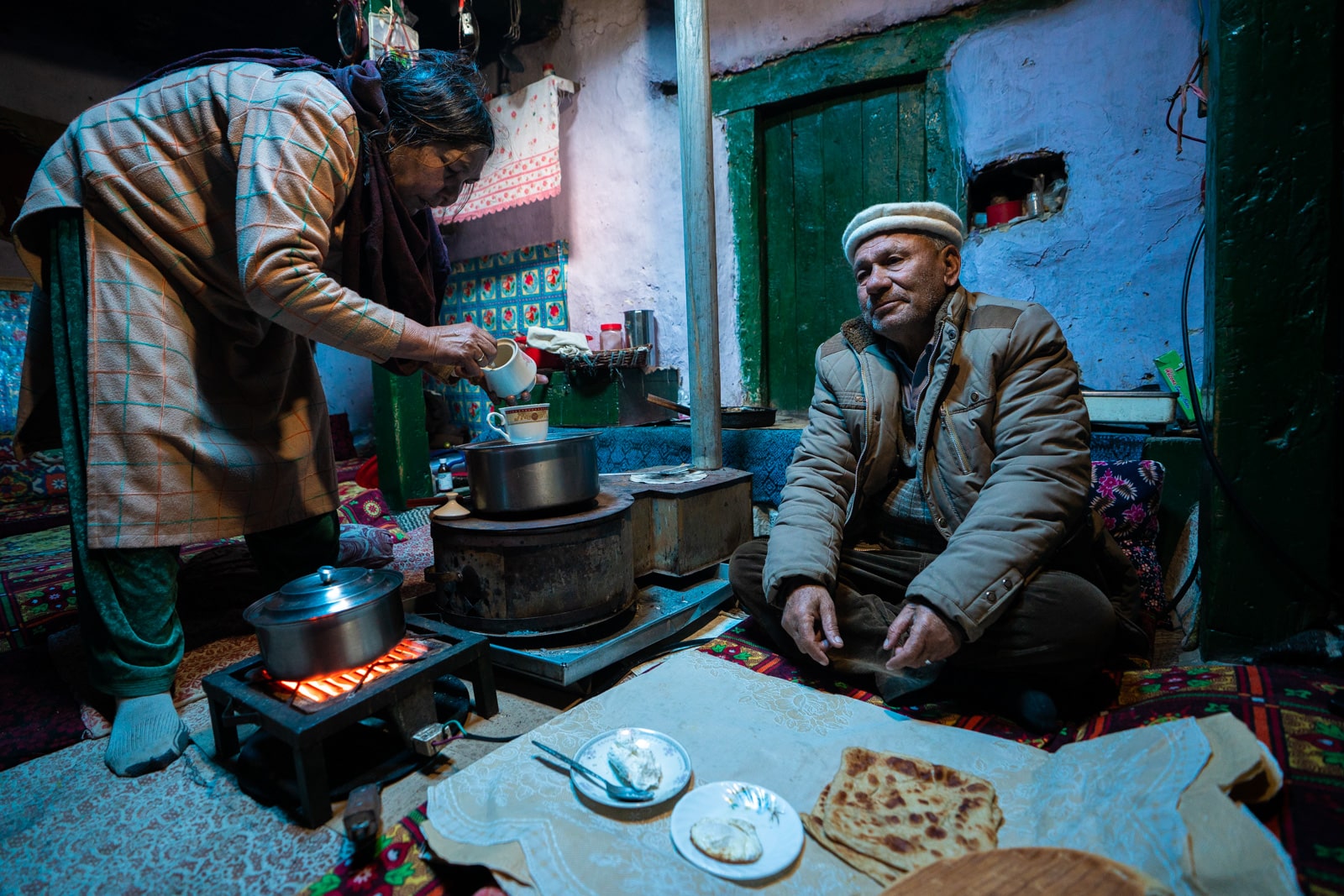
This man invited me to stay in his home about 3 seconds after meeting me. Sometimes you have to go with your gut and trust people in Pakistan!
Safety tips for travel in Pakistan
The most important thing you can do while traveling in Pakistan: trust your instincts. If something feels bad or suspicious, back off.
Vague, I know! Instincts come with time, and you’ll figure things out while there. In the meantime, I recommend a few other safety basics to people visiting Pakistan:
Get a travel guide. Knowing where you’re going, where foreigners are allowed to stay, and cultural advisories is extra important in Pakistan. I personally use and highly recommend Pakistan Traveller by Tim Blight. I believe in it so much that I helped with the latest edition! Buy a PDF of Pakistan Traveller here.
Always have a local SIM card and a local’s phone number. It might sound strange now, but trust me—people will offer their phone number to you for assistance often. Save some! They’re useful for translating in tough spots, letting people know where you are, and staying in touch with hosts and other helpful folks. Telenor and Zong offer the best mobile coverage in Pakistan.
Don’t hesitate to take a tour if you’re not ready to go alone. There are many companies running all kinds of tours in Pakistan; I myself run several kinds! Check out my 3-week women-only Pakistan tour or my 2-week Pakistan adventure motorcycle tour if they sound like your cup of chai.
Reach out to locals and experienced foreigners for information. Facebook groups such as Backpacking Pakistan (mostly foreigners only), See You in Pakistan (local and foreign), and Female Pakistan Travelers (local and foreign women only) are treasure troves of information and contacts. Couchsurfing is another great resource for connecting with locals.
Watch yourself in big crowds. From bum grabs to brick throwing to bag snatching, crowds can be tricksy business. Watch your things—and your parts—in thick crowds, just in case.
Have faith in people. I know this guide can be intimidating, but in the end, having faith in people you meet is important to enjoying your time in Pakistan. Most Pakistanis are very welcoming of foreign guests, and will do their best to make sure your visit goes smoothly. Constant suspicion is tiring; trust people who seem good. I assure you, if someone’s inviting you to their house, it’s probably because they want to introduce you to their family and stuff you full of food, not blast you into bits. Just sayin’.
Want more on Pakistan? Don’t miss this guide with everything you need to know about travel to Pakistan!
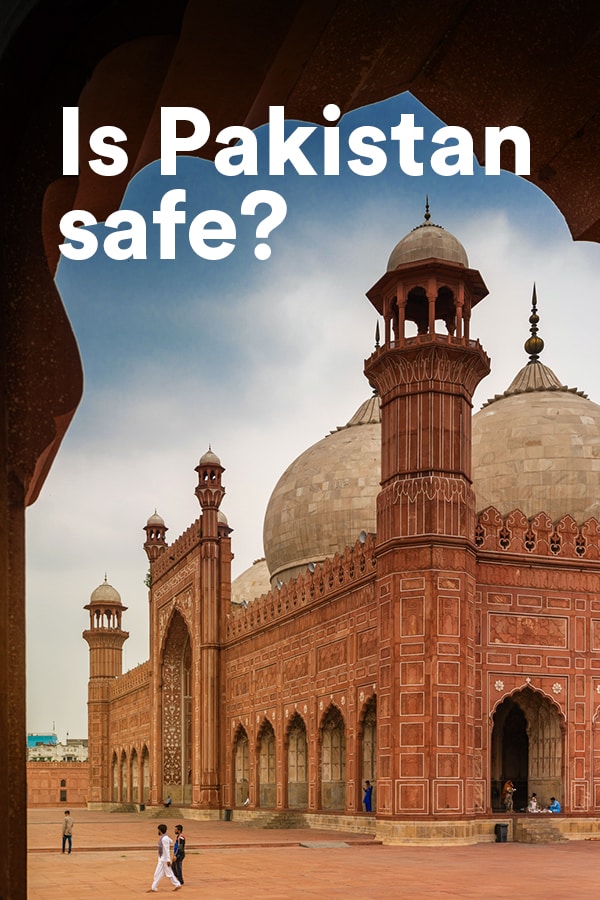
Pin it!
Yay transparency! There are affiliate links in this post. If you buy something using my links, I’ll make a bit of change at no extra cost to you. Don’t worry, I only recommend things I use or would use myself. I ain’t evil.
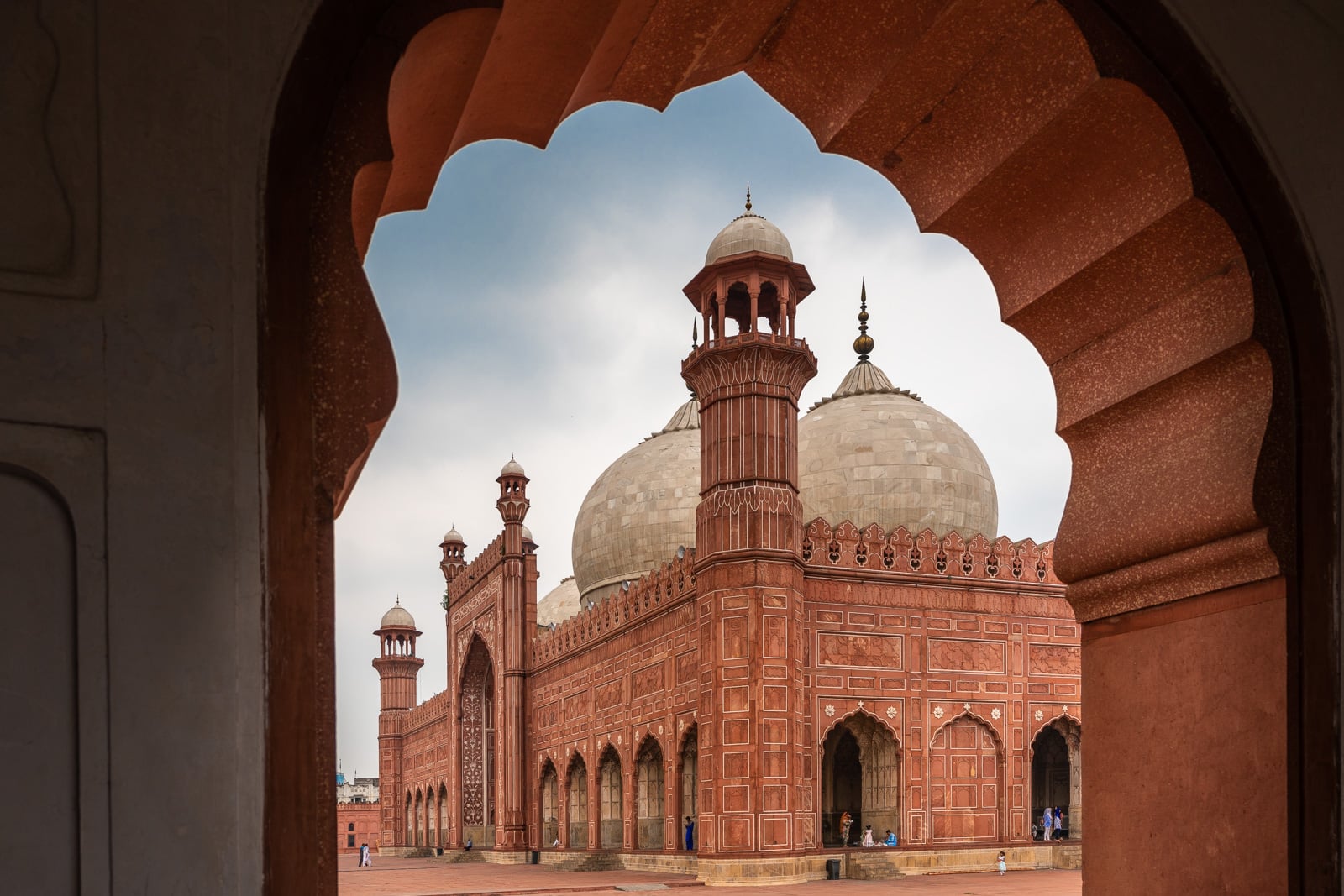


Thank you sharing amazing info for international community
Al Ajr Travel
Hi, I’m curious what you think about current safety with the protests going on in the cities (mainly Ishlamabad)?
Hi Eline. Protests over Imran Khan have been happening for a while. Protests are usually worse in the news (especially abroad) than they are in real life. Islamabad is quite an organized city; protests are restricted to certain areas of the city (you’d have to go looking for them most of the time) and the main impact they have on travel is road closures and increased traffic in Islamabad. I’ll be heading to Pakistan in a couple of weeks and I’m not worried about them.
You are the ONLY one saying it is safe, all authorities and other travelers are advising to stay away unless completely necessary. Aren’t you worried your article will influence someone to travel to an unsafe region where increased attacks are occurring? I’m going to listen to the authorities for my safety. Beautiful photographs though.
Words cannot capture the sheer magnificence of my visit to Skardu! From the awe-inspiring peaks of the Karakoram range to the crystal-clear waters of Satpara Lake, every moment felt like stepping into a fairytale. Skardu’s untamed beauty left me speechless, and the warm hospitality of the locals made me feel right at home.
My Trip was well Organized by skardutrekkers.com
I believe Pakistan is mostly safe to travel in. There are many documented testimonials on YouTube and elsewhere from various travelers, all raving about it’s natural beauty and hospitality. I know a person who has traveled to over a hundred countries and put Pakistan in their top five. You can see such travel as grassroots bonding and education between people of different cultures. I tend to think that is a good thing, and is frankly the best way to subvert negative stereotypes and propaganda. The only reason to truly avoid Pakistan would be philosophical, and I cannot criticize someone for not wanting to go there based on Pakistan’s history and tendencies as they relate to harboring terrorism and support for the Taliban, and murder of Benazir Bhutto. Imran Khan’s detainment is only the latest disappointment to consider.
Abby, PLease stay home and watch TV and let others have a real life….No one will miss you.
Hi Alex,
I am planning to travel in Balochistan early March. I have visa and NOC sorted out.
It appears I will have armed security guard and driver (in addition to my guide who I have traveled with in Pakistan before and trust).
Plan is: 4th Arrive Lahore, Sightseeing etc. 5th my meeting and leave Lahore on 40 Dn Jaffar Express. Arrive Quetta 6th afternoon. 7th Quetta sightseeing (Suggestions? Thinking Hanna Lake… not so much Ziarat). 8th Drive Quetta to Khuzdar, on the way visit Bibi Nani shrine, Pir Ghaib falls, and Kalat Kali Mata temple. 9th Drive Khuzdar (Pir Ibrahim? Moola Chotok? But they maybe too out of the way) to Hingol National Park (Stop in Uthala, maybe?) 10th Hingol National Park, Hinglaj Mata Mandir, Kund Malir Beach 11th Drive to Karachi see Sassi Punnu Shrine (maybe). 12th slack day in Karachi for unforeseen events. Sightseeing. 13th Fly out of Karachi.
Any comments/suggestions? Add/delete?
Thanks in advance.
Thanks for sharing this! I just came back from Pakistan where I visited Islamabad, Rawalpindi, Peshawar and Lahore. Islamabad is such a green and well organized city! Lahore was my favorite, so beautiful! As for Peshawar, we did get armed police officers assigned to us as it was the Eid vacation and on the way they did not allow us to visit a monastery as it was very crowded and they could not guarantee our safety. I found Peshawar a bit grey and it was my least favorite visit. We wore headscarves and long clothes to try to fit in better. The border ritual in Lahore was absolutely fantastic! The energy and everything. All in all it was a great experience, except that as a vegetarian it was not so easy to find a lot of veggies.
What a hoot this article is. “It’s so safe here!” Meanwhile, half the country is off limits, and many of the available areas have off limits zones. I don’t think a good case was made here for Pakistan being safe.